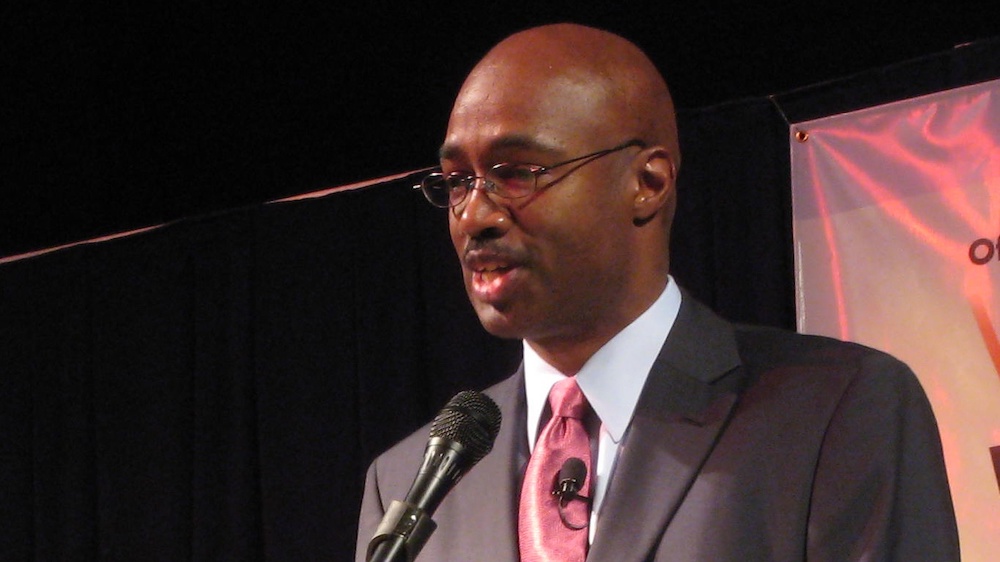If you’re interested in sharing your opinion on any cultural, political or personal topic, create an account here and check out our how-to post to learn more.
____
Having grown up in Queens, Larry Irving would one day be recognized as an internet strategist and policy innovator, fulfilling a vision that no one could have imagined. The internet hadn’t even been invented yet and Black kids from the boroughs rarely had an opportunity to experience high tech. But just as Dr. King recognized the connection between the brilliance of the stars and the brilliance of a great mind, Larry Irving charted a career that included serving as a principal architect of the Clinton Administration’s telecommunications policy and the 1996 Telecommunications Act, which still serves as the North Star for policies leading to the exponential growth of an industry. The “light touch” policy for the internet ecosystem championed by Irving is why we are beginning to embark on a revolution called the Internet of Things (IoT). Soon, our touch and our voices will control machinery and activities in every aspect of our lives.
Recently, Black History Month presented an opportunity to highlight contributions of those who have paved the way for the United States to lead the world in technological innovation. Larry Irving is one of those stories.
Long before anyone ever fought over “net neutrality” — discrimination between different bits of data — Irving was focused on rooting out discrimination on a technology platform that was still very new to most Americans. Irving was convinced that everyone needed access to the powerful tool that is the internet. He coined the phrase “digital divide” and understood from the very beginning that online access would create privilege and boundless opportunity. In contrast, lack of internet access would be the equivalent of banishing the have-nots to a barren planet.
Participation fuels productivity. And once everyone is connected to broadband, everyone will be connected to each other. No one should be left behind.
Irving was named one of Newsweek Magazine’s 50 Most Important People in the “Year of the Internet” issue. Last year the Internet Society — a worldwide body of international experts representing over 31 countries — inducted Larry Irving into the Internet Hall of Fame, the first African American to receive this honor. The implications reverberate as a call to action for Black professionals and students to take their place in a powerful ecosystem of technology. They will carry on Irving’s legacy of grappling with the tech industry’s lack of diversity, discrimination-by-algorithm and mishandling of personal data, as well as the enduring digital divide in our tech-centric culture. These challenges represent the burdens of tech’s success. More importantly, they require a melting pot of great minds to ensure that the technology shaping our world today looks like America and reflects our nation’s spirit of inclusiveness.
When all Americans — not just Black people — recognize the work of Larry Irving, we are reminded to elevate the impact of policy on the lives of our fellow Americans. In nerd world, that means techie idealism should not trump real benefits to real people. For example, “zero-rating” — the practice of providing consumers internet access through advertising subsidization or to a limited number of websites, with no financial cost — shouldn’t be dismissed by net neutrality purists. People with the luxury of routine access can obsess over a purist experience. For people who cannot afford that luxury, free internet access is like being invited to see a garden then soon discovering Wakanda.
Larry Irving is a definitive, relevant and woke example of how one person’s journey can change the world for countless others. As Dr. King would say, “All labor that uplifts humanity has dignity and importance and should be undertaken with painstaking excellence.” When these words were uttered, it was clear that Internet Strategist was not on the list of labor for a Black man. Nonetheless, Irving clearly embodies painstaking excellence in his quest to bridge the digital divide.
____
Kim Keenan is co-chair of the DC-based Internet Innovation Alliance. She formerly served as the President and CEO of the Multicultural Media, Telecom & Internet Council (MMTC). She also is the longest-serving female General Counsel in the 100+ year history of the NAACP.

